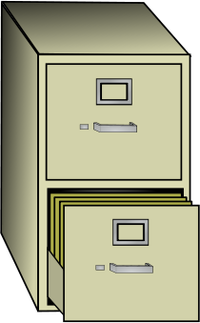Filesystem
(→Single-system filesystems) |
(→Single-system filesystems) |
||
| Line 20: | Line 20: | ||
* [[AthFS]] (AtheOS/Syllable) | * [[AthFS]] (AtheOS/Syllable) | ||
* [[BFS]] (BeOS) | * [[BFS]] (BeOS) | ||
| − | * [[ | + | * [[Btrfs]] (Linux) |
* [[CBMFS]] (Commodore 64, PET, etc.; 5.25" disks) | * [[CBMFS]] (Commodore 64, PET, etc.; 5.25" disks) | ||
** [[Commodore 1581 filesystem]] (3.5" disks) | ** [[Commodore 1581 filesystem]] (3.5" disks) | ||
| Line 70: | Line 70: | ||
** [[Reiser4]] | ** [[Reiser4]] | ||
* [[SDFS]] (Deduplication based filesystem) | * [[SDFS]] (Deduplication based filesystem) | ||
| + | * [[securefs]] [https://github.com/netheril96/securefs] | ||
* [[SFS (Amiga)|SFS]] (Smart File System, Amiga) | * [[SFS (Amiga)|SFS]] (Smart File System, Amiga) | ||
* [[Sinclair QL filesystem]] | * [[Sinclair QL filesystem]] | ||
Revision as of 16:08, 6 April 2018
Filesystems are Electronic Formats that are a prerequisite to being able to read any file off a digital medium — you have to be able to mount the filesystem, and thus read it, in order to be able to read a file.
Contents |
Single-system filesystems
(How files are organized on one system, device, or medium, such as a disk, tape, or flash memory; see next category for networked and cloud filesystems. Of course, any filesystem can be made available on a network to remote devices, but these are the native filesystems present on the storage device/medium itself.)
- +D filesystem (Sinclair, SAM Coupé)
- Acer Fast Filesystem (SCO OpenServer)
- ADFS (Acorn MOS, RISC OS)
- AdvFS (Advanced File System, Digital/Tru64 Unix)
- AFS (Ami File Safe, Amiga)
- APF Imagination Machine disk file system
- Apple DOS file system (Apple II; see also ProDOS below)
- Apple File System (APFS) (2017 system for Apple devices)
- Atari File Management Subsystem (FMS: Atari 400/800)
- AthFS (AtheOS/Syllable)
- BFS (BeOS)
- Btrfs (Linux)
- CBMFS (Commodore 64, PET, etc.; 5.25" disks)
- Commodore 1581 filesystem (3.5" disks)
- GEOS VLIR (GEOS Variable Length Index Record )
- CMDFS (CBMFS extension by Creative Micro Designs)
- Compucolor file system
- CP/M file system
- cramfs
- DDFS (Data Domain File System)
- DTFS (Desktop File System, SCO OpenServer)
- EFS (Extent File System, SGI IRIX. Replaced by XFS)
- EOS file system (Coleco Adam "data pack" tape drives and disks)
- ext (developed for Linux, previously used MINIX fs)
- ext2, ext3, ext4 (these are all just variants of each other)
- F2FS, (Flash Friendly Filesystem)
- FAT
- FFS (Amiga Fast File System)
- Files-11 (VMS)
- Firmware File System
- Fossil (Plan 9)
- HAMMER (DragonflyBSD)
- HFS (MacOS)
- HFS+
- HPFS (OS/2 native file system)
- ISO 9660 (optical discs)
- JFFS2
- LanyFS (Lanyard Filesystem)
- Linear Tape File System (LTFS)
- LogFS
- MDR (audio instrument format close to MSDOS)
- MFS (ancient Macintosh filesystem)
- MINIX file system
- NILFS2
- NOVA
- NTFS
- OFS (Amiga Old File System)
- PFS (Professional File System, Amiga)
- POHMELFS (distributed Linux filesystem)
- PRAMFS (Persistent & Protected RAM File-System)
- ProDOS file system (Apple II) (also used in Apple III SOS)
- QFS
- ReFS (Microsoft's new FS- Resilient Filesystem, on Windows 8 Server)
- ReiserFS
- SDFS (Deduplication based filesystem)
- securefs [1]
- SFS (Smart File System, Amiga)
- Sinclair QL filesystem
- SkyFS (SkyOS)
- squashfs
- TFS [2]
- UCSD p-System Filesystem (UCSD Pascal)
- UFS (Unix Files System, Solaris and BSD)
- Universal Disk Format (UDF) (optical discs)
- VMUFAT (Filesystem for Dreamcast VMU units)
- VSAM (Virtual Storage Access Method)
- VxFS (VERITAS File System)
- WAFL (NetApp's commercial file system)
- WBFS
- Xiafs (Linux, dropped in favour of ext2)
- XFS (SGI)
- XtreemFS, (Linux, distributed file system)
- YAFFS
- ZFS
- zisofs
Networked and cloud filesystems
(Used to make files available to multiple systems over a local or wide area network, including "on the cloud" via the Internet; systems access files through a protocol or API. The low-level storage details, usually concealed from end users and even most developers, may be within one or more of the single-device filesystems above, and the networked/cloud filesystem is generally defined independently of such details and might have very different characteristics and rules as to how the files are named, addressed, and structured.)
- Amazon S3
- Andrew File System (Carnegie Mellon University)
- Google Drive
- Google File System
- Hadoop Distributed File System (HDFS)
- IPFS
- Keybase filesystem
- Longaccess
- MEGA file system
- NetWare File System (Novell NetWare, replaced by NSS)
- NFS (Unix network filesystem protocol)
- NSS (Novell Storage Services)
- OneDrive (Microsoft)
- OpenStack Swift
- Permacoin (also a currency)
- SFS (SyncFS)
- SMB (Server Message Block, a protocol for a networked filesystem)
- Storj (another currency/filesystem scheme)
- WebDAV (network filesystem implemented as extensions to HTTP)
Virtual filesystems
- %clay vane (Urbit)
- AVFS
- FUSE
Other / Misc.
File content signature
(used to match files to a hash table or similar system in order to detect duplicates, help find specific files when their exact location is unknown, handle distributed networked filesystems, etc. See also Error detection and correction.)
Format details
- AppleDouble
- Apple Partition Map
- AppleSingle
- desktop.ini (Windows)
- Desktop Services Store (Mac OS X)
- GUID Partition Table
- Master Boot Record (MBR)
- Resource Fork (MacOS)
- TRANS.TBL
Links
- List of file systems (Wikipedia)
- Cloud Storage Architectures
- Hierarchical File Systems are Dead
- Do filesystem-based checksums add value in a digital preservation context?
- My experience with using cp to copy a lot of files (432 millions, 39 TB)
- Crash-proof filesystem
- Know Your Filesystem
- File crash consistency and filesystems are hard
